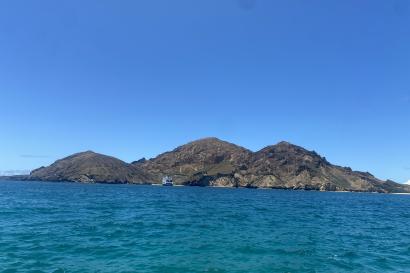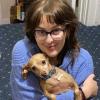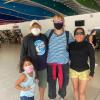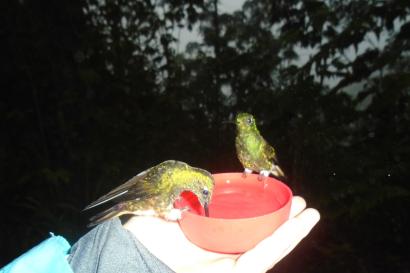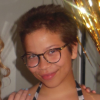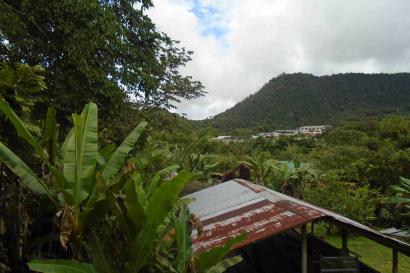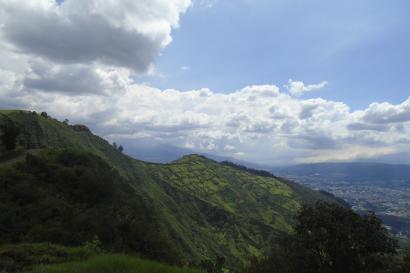••
All of the water in Quito comes from the mountain.
The mountain behind our hotel is grand & taller than any building I’ve ever seen. In the distance, it is always dark. In the cleft of the mountains, a hot volcano folds into a river and the sky fills with clouds in deep grey. No one can ever tell whether it will or won’t rain. My senses are obscured here. A wet mist steams past and it is still not rain, just the sky, pinching its eyebrows tight like a father. In the morning, the sun darts past my face so quickly there is no dawn, only seconds between the black night and morning.
Here, the sky doesn't even yawn.
•
In Minnesota, there are four distinct seasons. Here, there are only two. Hot and wet. Dry and cold.
•
Cold: the day before I left, it was -20 degrees Fahrenheit in Minnesota. I picture my father swirling tires through the snow. The air by the pool is wet and soft. When I left, my nose was so dry at night that I’d wake up each morning with blood on my pillow. Here, it is still dry, but I walk and the ground does not trick me into deep, cool collisions.
•
The water here tastes different, more like a well, like iron, or snow melted in someone’s cheeks.
•
Every time I open a different container: my water bottle, my sunscreen, my lotion: it “pops.” The plane has turned my toiletries to whipped cream. As we ascend into the sky I realize that when I leave this place, I will not be flying. I will be falling.
•
Whenever I visit somewhere with mountains, I think of one of my past roommates, Andrea. When she moved to Illinois from dynamic Southeastern China, she said she felt like a bug, flattened onto a slide, magnified under the microscope of the sky. How to feel this feeling in reverse? Standing next to a skyscraper of rock, I feel like a child, the long forgotten feeling of infinity. From the plane, I realize the feeling was more like being a hamster in a corn maze. All the roads are carved into the Andes, and, from above, you can see which places were far too high to break a street through. They are green. Green etched with slate.
•
We learn that the mountain is actually a volcano. Cotacachi. At the top, the magma port is covered in snow. This is a metaphor for something I cannot put my finger on yet.
•
Somewhere, somewhere I will be soon, a volcano is erupting. I keep getting DMs of the news story. Are you sure you still want to go? This is a question I cannot answer. All I know of volcanoes are pictures of volcanoes, Mentos and Coke, baking soda and vinegar.
Pompeii.
•
Lake: the opposite phenomenon.
•
Cuicocha. “Cui” meaning guinea pig. Cui, onomatopoeia, the chirp of the rodent. Cocha: still water. In the stillness, we find no cui. This is a good thing. On the lake, the tour guide tells us all in Spanish that there is a legend here: if you see the cui before it sees you, you have good luck for the rest of your life. If the cui sees you before you see the cui, you become part of the lake. Your soul is wound into a blackbird.
•
When it is warm and wet, conch shells wash to the beaches. The tour guide tells us, the Inca people know that conch means rain. Or, maybe I am translating wrong. Maybe the omen was reverse. I google it, and find nothing. So many stories here, lost to my half-tuned ears.
•
The guide tells us: before the Inca people were here, there were other groups. He does not name them. In class, we read a paper where the authors are named Dietz, et. al. The professor reminds us to always read every name. The first named is rarely for reasons of importance. More often, convenience.
•
Names we remember:
All of the Franciscans.
Saint Paul.
Simón Bolivar.
••
***The zuihitsu form here is borrowed from traditional Japanese literature. Zuhitsu is a form made famous by The Pillow Book by Sei Shonagon. The form is often strings of loosely connected prose / poetry / essay fragments. To learn more about the zuihitsu form, check out Kimiko Hahn’s The Zuihitsu and the Toadstool.

Anna Sverclova
My name is Anna Šverclová. I'm a published poet and creative writing major at Macalester College. I love exploring the world around me. You can almost always find me digging in the mud by the river, journal in my back pocket. My writing focuses on my relationship with the world, childhood trauma, and my hometown. I write both for the page and for performance. You can find me at annasverclova.com

